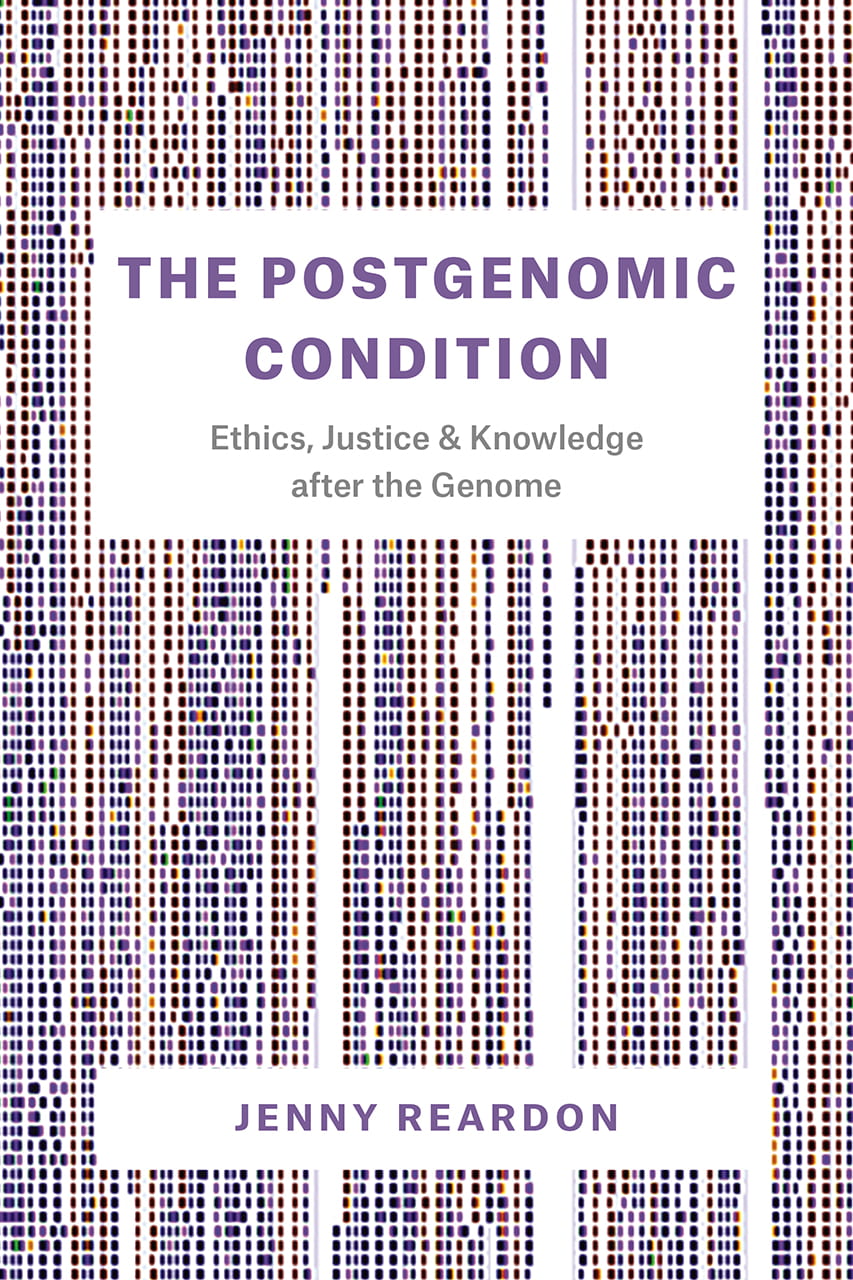The Post Genomic Condition: Ethics, Justice, Knowledge After the Genome

The Post Genomic Condition: Ethics, Justice, Knowledge After the Genome. University of Chicago Press, 2017.
Now that we have sequenced the human genome, what does it mean? In The Postgenomic Condition, Jenny Reardon critically examines the decade after the Human Genome Project, and the fundamental questions about meaning, value and justice this landmark achievement left in its wake.
Drawing on more than a decade of research—in molecular biology labs, commercial startups, governmental agencies, and civic spaces—Reardon demonstrates how the extensive efforts to transform genomics from high tech informatics practiced by a few to meaningful knowledge beneficial to all exposed the limits of long-cherished liberal modes of knowing and governing life. Those in the American South challenged the value of being included in genomics when no hospital served their community. Ethicists and lawyers charged with overseeing Scottish DNA and data questioned how to develop a system of ownership for these resources when their capacity to create things of value—new personalized treatments—remained largely unrealized. Molecular biologists who pioneered genomics asked whether their practices of thinking could survive the deluge of data produced by the growing power of sequencing machines. While the media is filled with grand visions of precision medicine, The Postgenomic Condition shares these actual challenges of the scientists, entrepreneurs, policy makers, bioethicists, lawyers, and patient advocates who sought to leverage liberal democratic practices to render genomic data a new source of meaning and value for interpreting and caring for life. It brings into rich empirical focus the resulting hard on-the-ground questions about how to know and live on a depleted but data-rich, interconnected yet fractured planet, where technoscience garners significant resources, but deeper questions of knowledge and justice urgently demand attention.
Available at The University of Chicago Press, 2017.
Reviews of The Postgenomic Condition
2020. Ayo “Justice and Solidarity in Post-genomic, Post-personalized Times”, Science as Culture, DOI: 10.1080/09505431.2020.1802710 August (PDF)
2020. Raffaet, Roberta. “Biopolitica e giustizia sociale all’epoca dei big e open data”. Rivista della Società Italiana di Antropologia Medica. June (PDF)
2019. Hughes, Cris. “The Postgenomic Condition: Ethics, Justice, and Knowledge after the Genome.” American Journal of Physical Anthropology. November. (PDF)
2019. Panofsky, Aaron. “The Postgenomic Condition: Ethics, Justice, and Knowledge after the Genome.” Contemporary Sociology: A Journal of Reviews, DOI: https://doi.org/10.1177/0094306119867060ee. September. (PDF)
2019. Parker, Lisa. “The Postgenomic Condition: Ethics, Justice, and Knowledge after the Genome.” Hypatia Reviews Online. August. (PDF)
2019. Dousa, Roberta. “Notes on ‘Ethics, Justice and Knowledge After the Genome’.” Medium. May 09.
“The Postgenomic Condition reveals the urgency that belies the need for bioinformatic and technological endeavors that foremost attend to people’s fundamental needs with robust and structural approaches. Central to this, Reardon stipulates, is the creation of political frameworks —beyond those afforded by liberal democratic precedent — that will allow for meaningful debate and examination of what research must address, how it should be enacted, what its effects might entail, and how its benefits might be shared.”
“The Postgenomic Condition makes evident that the decisions we make now as we develop the field of genomics hold a solemn magnitude — they will continue to shape and direct the meaning of (global) health, personal information, and biomedicine for decades to come. Our decisions and indeed, our research choices, stand as a reflection of our values.”
2019. Wahlberg. “Justice and solidarity in post-genomic, personalized times”. Science as Culture. January. (PDF)
2019. Dubois, Michel. “The Moral Heart of Genomics and the Failures of Liberalism”. European Journal of Sociology. (PDF)
2018. List, Justin M. “The Postgenomic Condition: Ethics, Justice and Knowledge after the Genome”. Christian Century. (PDF) November 7.
2018. Bartram, Isabelle. “Worauf bezieht sich der Titel Ihres Buchs “The Post genomic Condition“? (After the Genome: Justice and Genome Research).” Gen-ethisches Netzwerk. August 31. (PDF)
2018. Iwema, C.L. Recommended by CHOICE connect. (PDF) September.
2018. Gilbert, Scott F. “Health Fetishism among the Nacirema: A Fugue on Jenny Reardon’s The Postgenomic Condition: Ethics, Justice and Knowledge After the Genome and Isabelle Stenger’s A Manifesto for Slow Science.” Organisms: Journal of Biological Sciences Vol 2 (1). July.
2018. Miloni, Maurizio. “After and Beyond the Genome: Taking Postgenomics Seriously.” Somatosphere. June 15.
2018. Neuhaus, Carolyn. “Personalized Medicine Is The Postgenomic Condition.” Hastings Center Report. May-June, 46-47.
2018. Valasek, Chad. Podcast of The Postgenomic Condition: Ethics, Knowledge and Justice after the Genome. New Books Network. April 20.
2018. Pierce, Jake. “UCSC’s Jenny Reardon on Genomic Research.” Good Times. April 11.
2018. Nicholas, Lydia. “When Gene Tech Hides in Plain Sight“. New Scientist. Jan 27.
2017. Rosario, Isasi. “Justice in Genomics.” Nature Vol 551, p 296-7.
Endorsements
“The Postgenomic Condition is a beautifully tendered plea for a revived approach to ethics in genomics – one that invites wide open discussion that includes the experiences and interests of traditionally marginalized groups.” Sarah S. Richardson, Harvard University